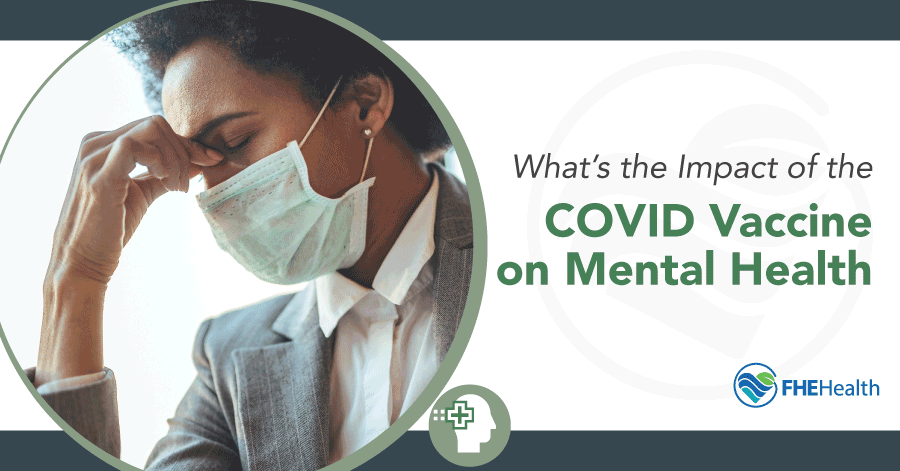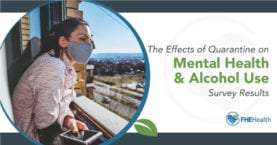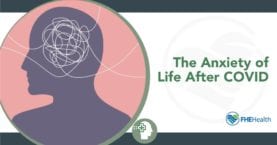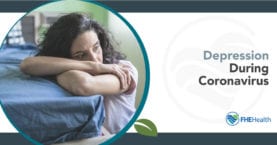
While the long-term effects of the global pandemic won’t be fully realized for decades, the links between mental illness and COVID-19 have been clear from the start. The stress of facing a deadly virus during a period of lengthy isolation, increased unemployment, and a decrease in access to consistent support has contributed to an uptick in mental health problems nationwide.
But now that the COVID-19 vaccine is available and the United States is gradually lightening restrictions, things seem to be returning to a degree of “normal.” This is uncharted territory for most Americans. While there are reasons to believe mental health will improve in the aftermath, there are also a few very realistic scenarios in which mental health gets worse.
In this piece, we’ll look at both sides, going in-depth on the factors at play, and explain why it’s more important than ever to seek help if you or your loved ones are struggling.
Mental Illness and COVID-19
Reports of COVID mental symptoms have been frequent, both from populations who tested positive for the virus and those who didn’t.
Among people who’ve had COVID-19, 13% received their first diagnosis of a mental health condition within six months of contracting the virus. This was part of a study about COVID mental symptoms, which found that COVID-19 survivors were more likely to develop a mental health or mood disorder.
Before the pandemic, about 1 in 10 American adults reported symptoms of anxiety, depression or other mood disorders. During the pandemic, this number climbed to 4 in 10. Additionally, the occurrence of sleeping disorders, eating disorders and substance abuse issues increased across the board.
Many of these effects are likely to have come from isolation during quarantine, economic anxiety from the loss of income or the grief of losing loved ones to the virus. With the onset of the Coronavirus vaccine, how much of this will improve?
How Mental Health May Improve after Vaccine
There are a few ways in which it’s expected that the availability of a vaccine may improve overall mental health.
Mental Health Care Is Becoming More Accessible
Practice-based businesses have been hit the hardest during the pandemic. Even though psychiatrists and counselors are considered “essential businesses,” the lack of distancing space and hygiene requirements caused them to have to scale back during COVID-19. Now that restrictions are loosening, more appointments should be available.
Many mental health providers offered care virtually, which can be helpful, but this comes with some drawbacks that may make it insufficient for some people.
Isolation Is Ending
The source of many issues (or the flare-up of existing conditions) was the loneliness brought on by quarantine restrictions. These varied between regions of the United States, and most states instituted policies that significantly changed the access people had to their friends and loved ones.
Being social is a major aspect of mental health for many people. Now that the restrictions are loosening, that social aspect will slowly be restored.
Things Are Returning to “Normal”
Many people struggled to adjust to a sudden change in routine. Maybe they lost their job, started working remotely or were suddenly unable to visit family. These are dramatic lifestyle changes that occurred practically overnight — something that’s hard to prepare for, even if you know it’s coming.
As more people get vaccinated, many of those changes will slowly revert back. The job market is already recovering in many places, and the Centers for Disease Control and Prevention (CDC) is advising a safe return to normal behavior after getting the vaccine.
How Mental Health May Get Worse
On the other hand, there are also reasons to think that just because there are effective vaccines in circulation, it doesn’t mean all the damage of COVID-19 will disappear immediately:
People May Have Trouble Adjusting to New Circumstances
People who lost their jobs or faced eviction during the pandemic may face longer consequences and hardship. Unemployment reached a record high during COVID-19, and across the country, many people were unable to afford basic necessities. Even if everyone who lost their job gets a new one immediately, it’s not going to undo the impact of the stress and trauma from suddenly not knowing how to feed your family and make ends meet.
People May Have to Deal With New Mental Illnesses
Many people may have developed a mental health condition, or had one worsen, as a result of the pandemic. A lack of normal socialization means more people will face things like social anxiety as they try to readjust to “normalcy.” Grief from the loss of loved ones to the virus guarantees that some people will carry the effects of the pandemic with them for the rest of their lives.
We mentioned in the last section that with the vaccine would come better access to critical mental health care, but with an increase in demand, will it be enough? Mental illness and COVID-19 are deeply intertwined, and it will need a coordinated effort from everyone involved to ensure help is accessible to everyone who needs it.
Be Honest With Yourself — Don’t Hesitate to Ask for Help
Even with things starting to return to “normal,” no one really knows what the next few years have in store. Many people developed mental health or substance abuse issues during the pandemic and should seek help as soon as possible, but even if you don’t fit into this group, understand that you may not adjust to changing circumstances as well as you think you will.
A new job or a change in living situation are just two examples of stressful situations that countless people will face in the aftermath of the pandemic. It’s important that in the rush to return to a normal lifestyle you take the time to consider how these changes are affecting you and ask for help if and when you need it.
COVID-19 and Mental Illness: Get Help With FHE Health
At FHE Health, we have mental and behavioral health specialists standing by to help people get adjusted to their lives after COVID-19. While many people may be living with the scars of the pandemic for a long time, we can help them heal.
If you or a loved one is struggling with substance abuse or a mental health issue, whether it’s linked to the pandemic or not, don’t wait to get help. Call FHE Health today and learn more about your options.









